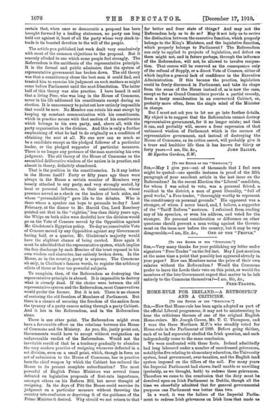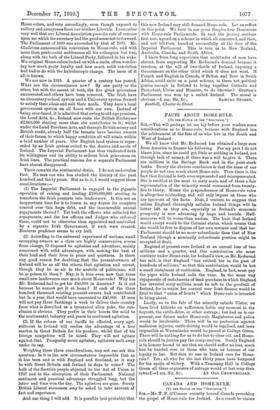HOME-R1TLE FOR TBilLAND.—A RETROSPECT AND A CRITICISM.
[To THE EDITOR OY THE "SPECTATOR."3
Sin,—Now that Home-rule has been again adopted as part of the official Liberal programme, it may not be uninteresting to hear the criticisms thereon of one of the original English Home-rulers. Mr. Joseph Cowen, Mr. T. C. Thompson, and I were the three Northern M.P.'s who steadily voted for Home-rule in the Parliament of 1880. Before going thither, each of us had separately studied the Irish question, and each independently come to the same conclusion.
We were confronted with these facts. Ireland admittedly had long laboured under a number of nnredressed grievances, notablythe five relating to elementary education, the University system, local government, over-taxation, and the English land system imposed on the tillers of the soil. For many years the Imperial Parliament had shown itself unable or unwilling (probably, as we thought, both) to redress these grievances. Therefore we came to the conclusion that the duty must be devolved upon an Irish Parliament in Dublin, though all the time we cheerfully admitted that for general governmental purposes one Parliament was better than two.
In a word, it was the failure of the Imperial Parlia. ment to redress Irish grievances on Irish lines that made us Home-rulers, and vote accordingly, even though exposed to raillery and annoyance from our brother-Liberals. I remember very well that our Liberal Association passed a vote of censure upon me which the secretary had the good sense not to forward. The Parliament of 1880 was succeeded by that of 1885. Mr. Gladstone announced his conversion to Home-rule, and with more than pentecostal suddenness all his colleagues but two, along with the bulk of the Liberal Party, followed in his wake. We original Home-rulers looked on with a smile, often wonder- ing how much party loyalty and how much solid conviction had had to do with the kaleidoscopic change. The issue of it all is known.
We are now in 1910. A quarter of a century has passed. What are the circumstances now P By one party or the other, but with the assent of both, the five great grievances enumerated and others have been removed. The Irish have an elementary-school system and a University system framed to satisfy their ideas and suit their needs. They have a local government system on all fours with our own. Instead of being over-taxed, it is admitted that owing to old-age pensions, the Land Acts, &e., Ireland now costs the British Exchequer 22,000,000 sterling more than she contributes to it ; whilst under the Land Purchase Acts, and through British money and British credit, already half the tenants have become owners of their farms, to which happy condition all will attain within a brief number of years. Our English land system is super- seded by an Irish system suited to the desires and needs of Ireland. The Imperial Parliament has thus vindicated both its willingness and its ability to redress Irish grievances on Irish lines. The practical reasons for a separate Parliament have almost disappeared.
There remains the sentimental desire. I do not undervalue that. No man can who has studied the history of the past hundred and thirty years. But as to it, I would suggest three considerations :- (1) The Imperial Parliament is engaged in the gigantic operation of raising and lending 2180,000,000 sterling to transform the Irish peasants into landowners. Is this not an inopportune time for it to lessen in any degree its complete control over this huge debt, and the innumerable annual repayments thereof P Yet both the officers who collected the repayments, and the law officers and Judges who enforced them, could not be otherwise than appointed and controlled by a separate Irish Government, if such were created. Business prudence seems to cry halt.
(2) According to the universal experience of nations, small occupying owners as a class are highly conservative, averse from change, ill-disposed to agitation and adventure, mainly concerned with solid advantages, with making the best of their land and their lives in peace and quietness. Is there any good reason for doubting that the peasant-owners of Ireland will be as all the others, that agitation and unrest, though they be as air to the nostrils of politicians, will be as poison to them P Nay, is it true even now that these small new landowners care much about Home-rule P Why has Mr. Redmond had to get his 240,000 in America ? Is it not because he cannot get it at home P If each of the three hundred thousand existing peasant-owners had contributed but 3s. a year, that would have amounted to 245,000. If men will not pay three farthings a week to deliver their country from what is described as a tyrannical alien yoke, the con- clusion is obvious. They prefer in their hearts the solid to the sentimental, industry and peace to continued agitation.
(3) If the reform of our tariffs be effected, every agri- culturist in Ireland will realise the advantage of a free market in Great Britain for his produce, whilst that of his foreign competitor will be taxed. They will not agitate against that. Prosperity never agitates; agitators melt away under its ray.
Weighing these three considerations, may not one ask this question : Is it in the new circumstances impossible that as it has been and is with England and Scotland, so it may be with Great Britain and Ireland in days to come ? The bulk of the Scottish people objected to the Act of Union in 1707 and to the absorption of their Parliament. National sentiment and practical advantage struggled long, but the latter and time won the day. The agitators are gone. Surely British Liberal statesmen may be asked to take account of fact and experience.
And one thing I will add. It is possible (not probable) that this new Ireland may still demand Home-rule. Let us reflect - on this point. We have in our great Empire four Dominions with Home-rule Parliaments. In each the jarring sections first met, agreed on a scheme in which all concurred, and then, and not till then, knocked successfully at the door of the Imperial Parliament. This is true as to New Zealand, Australia, Canada, and South Africa.
I know from long experience that multitudes of men have shrunk from supporting Mr. Redmond's demand because it involves, at the will of two-thirds of Ireland, imposing a Government on the other third which it does not want. If French and English in Canada, if Briton and Boer in South Africa, could unite on a joint scheme, is there not political genius enough in Ireland to bring together Catholic and Protestant, Ulster and Munster, to do likewise P Grattan's Parliament was won by a united Ireland. The moral is























































 Previous page
Previous page